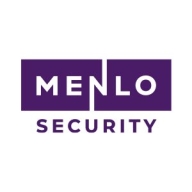



Menlo Security Secure Application Access
Menlo Security Secure Application Access makes zero trust access easy, giving users secure connectivity to private applications, including web and legacy applications. At the core of Secure Application Access is the Menlo Secure Cloud Browser, which fetches, secures and delivers the content for users.
In addition to providing simple-to-deploy, clientless ZTA, Secure Application Access and the Menlo Secure Cloud Browser protect applications from attacks such as session hijacking, cookie manipulation, and other tactics that employ protocol manipulation.
Secure Application Access protects applications from Internet threats and provides granular controls for added protection of the application and associated data. These security controls include Read-only/Read-write, Upload/download, Copy/paste, AV scanning, Sandboxing, and Data Loss Prevention.
Last Mile Data Protection
Menlo Last-Mile Data Protection identifies and prevents sensitive data from leaving your company by meticulously inspecting all file uploads and user input across browsing sessions. Leveraging the Secure Cloud Browser, users are protected from the internet and you can protect your organization from data loss with comprehensive traffic monitoring and controls. This approach addresses the growing concerns surrounding data leakage in the age of AI tools like ChatGPT.
By identifying sensitive data through file types, regular expressions, or predefined libraries, Menlo Last-Mile Data Protection empowers security teams to regulate data input into AI platforms and prevent unauthorized uploads. This capability provides crucial protection for intellectual property, PII, and other confidential information.
The solution leverages the Menlo Cloud Security Platform's visibility and control over traffic to reliably detect and prevent data leaks originating from both browser submission forms and non-browser traffic. With the ability to inspect encrypted web traffic, Menlo Last-Mile Data Protection enforces DLP policies consistently across all users and devices, ensuring comprehensive data protection.
Symantec Endpoint Security is a robust and reliable product that provides complete protection against viruses, malware, Trojans, and malicious files. It offers application and device control, ease of use in deploying and updating, a central control console, stability, scalability, auto-discovery capabilities, patch management, endpoint detection and response capabilities, intrusion detection module.
The Symantec Global Intelligence Network (GIN) provides threat intelligence and detection across endpoints, email, and web traffic. It has helped organizations reduce downtime, increase productivity, and improve security posture. Symantec Endpoint Security is easy to use, has a flexible administration, and offers more value than expected.
We monitor all Cloud Security Remediation reviews to prevent fraudulent reviews and keep review quality high. We do not post reviews by company employees or direct competitors. We validate each review for authenticity via cross-reference with LinkedIn, and personal follow-up with the reviewer when necessary.